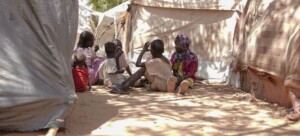Sudan Health Minister visits cholera patients in Blue Nile state
On Friday, Federal Health Minister Akram El Toom visited cholera patients in the El Roseires Hospital in Blue Nile state. The number of people in the state suffering from cholera symptoms has risen to 67.
Of these, 18 are being treated in isolation wards, the Blue Nile state Ministry of Health reported on Friday.
Five people died since the disease re-emerged in the state in late August.
On Friday, Federal Health Minister Akram El Toom visited the isolation ward at the El Roseires Hospital, together with Naeema El Gasseer, representative of the World Health Organisation (WHO) in Sudan.
 Anti-cholera campaigners hand out leaflets in Khartoum North, July 2017 (RD)
Anti-cholera campaigners hand out leaflets in Khartoum North, July 2017 (RD)
On Friday, Federal Health Minister Akram El Toom visited cholera patients in the El Roseires Hospital in Blue Nile state. The number of people in the state suffering from cholera symptoms has risen to 67.
Of these, 18 are being treated in isolation wards, the Blue Nile state Ministry of Health reported on Friday.
Five people died since the disease re-emerged in the state in late August.
On Friday, Federal Health Minister Akram El Toom visited the isolation ward at the El Roseires Hospital, together with Naeema El Gasseer, representative of the World Health Organisation (WHO) in Sudan.
Addressing a group of health activists and members of district committees after the visit, the Minister said that he will address the shortcomings at the hospitals in Blue Nile state, and discuss the demands raised by the state government and the Supreme Committee for Autumn Emergencies.
He urged the formation of joint committees between members of the district committees and the Forces of Freedom and Change, as well as enhanced coordination between the Health Services Committee and medical cadres to fight the disease.
WHO
In a statement on Wednesday, the WHO confirmed that between August 28 and September 10, Sudan’s Federal Ministry of Health reported at least 51 cases of ‘acute watery diarrhoea’ in Blue Nile state. Samples taken from six patients and sent for analysis to the Ministry’s National Public Health Laboratory showed that four of the six samples tested positive for Vibrio cholerae.
“Due to suboptimal health conditions and poor safe water and sewage system structures, exacerbated by polluted water sources caused by recent floods, there is a risk of cholera and other diarrhoeal diseases spreading if no immediate response interventions take place,” said the WHO representative in Sudan.
On Monday, the Sudanese Ministry of Health confirmed four cases of cholera in Blue Nile state. Since 2017, the Sudanese government (and conniving international organisations) has consistently referred to cases suspected to be cholera as ‘acute watery diarrhoea’, in spite of solid pathological evidence (according WHO standards) of cholera. Sudan’s acknowledgement therefore represents something of a breakthrough.
Follow #CholeraInSudan, #ألكوليرا_السودان
Radio Dabanga’s editorial independence means that we can continue to provide factual updates about political developments to Sudanese and international actors, educate people about how to avoid outbreaks of infectious diseases, and provide a window to the world for those in all corners of Sudan. Support Radio Dabanga for as little as €2.50, the equivalent of a cup of coffee.












 and then
and then